In the fast-paced world of e-commerce, customer expectations are higher than ever. With the rapid advancement of technology, businesses must adapt to deliver truly personalized shopping experiences. Enter AI-driven personalization, a game-changing innovation that is revolutionizing the way e-commerce platforms connect with their customers. By leveraging artificial intelligence, businesses can now provide tailored product recommendations and customized marketing messages that resonate with each individual, fostering deeper engagement and driving sales.
Table of Contents
This article delves into how AI is transforming customer experiences in e-commerce, highlighting its various applications and offering valuable insights for e-commerce entrepreneurs and marketers looking to stay ahead of the curve.
What is AI-Driven Personalization?
AI-driven personalization refers to the use of artificial intelligence technologies to deliver customized experiences for users—whether it’s recommending products based on their browsing habits or sending marketing messages that align with their individual preferences. Through machine learning algorithms and data analytics, businesses can gather insights from customer interactions, such as purchase history, browsing behavior, and demographic information. This allows them to craft personalized experiences that not only meet but anticipate customer needs.
The result? A seamless and engaging shopping experience that resonates with customers on a personal level—leading to higher satisfaction, loyalty, and ultimately, increased sales.
Personalized Product Recommendations: A Smarter Shopping Experience
At the heart of AI-driven personalization lies product recommendations—a core feature that has been effectively utilized by leading e-commerce platforms like Amazon and Netflix. AI algorithms analyze vast amounts of customer data, identifying patterns in purchase history, search queries, and even social media behavior. This data enables businesses to suggest products that are most likely to interest a customer based on their individual preferences.
For example, if a shopper frequently browses eco-friendly home products, the AI system may recommend new arrivals in this category or suggest complementary items they might not have considered. Over time, the system learns from customer interactions, continuously refining its recommendations and delivering more relevant suggestions with each visit.
The beauty of AI product recommendations is that they increase conversion rates by making the shopping experience more intuitive and personalized—customers are more likely to purchase products they feel are tailored to their tastes.
Customizing Marketing Messages: Speaking to Your Customers’ Needs
Gone are the days of generic, one-size-fits-all marketing strategies. AI-driven personalization extends beyond product recommendations to tailored marketing messages that speak directly to each individual’s needs. This level of personalization is possible because AI algorithms can segment customers based on factors like purchase history, location, and behavioral data, allowing marketers to send highly relevant emails, ads, and offers.
For example, if a customer has recently shown interest in a particular category—say, organic skincare products—AI can trigger an automated email with product suggestions, reviews, and a special discount offer related to that category. This approach not only increases the chances of conversion but also builds a stronger, more personal relationship with the customer.
By engaging customers with relevant content, e-commerce businesses can boost customer loyalty and ensure that their marketing efforts are more impactful and well-targeted.
Dynamic Pricing: Real-Time Price Adjustments Powered by AI
AI doesn’t stop at product recommendations and marketing messages—it’s also revolutionizing how businesses approach pricing strategies. Dynamic pricing, enabled by AI, allows businesses to adjust prices in real-time based on various factors, such as demand, competitor prices, and customer behavior.
For example, if a product is in high demand, the AI system can automatically raise the price to capitalize on the increased interest. Alternatively, during slower periods, the AI can suggest price cuts or offer personalized discounts to attract more customers. This level of flexibility ensures that businesses remain competitive and can optimize their profitability while still providing customers with fair and personalized pricing.
Dynamic pricing powered by AI offers a unique opportunity to stay ahead of the competition and ensure that customers receive offers that are not only timely but also relevant to their purchasing habits.
AI-Powered Chatbots: Personalized Support and Engagement
Another powerful tool in AI-driven personalization is the use of AI-powered chatbots. These intelligent virtual assistants interact with customers in real-time, providing personalized support, answering questions, and even offering product recommendations. Chatbots are available 24/7, making them an essential resource for businesses looking to provide immediate assistance to customers, regardless of time zones.
AI chatbots can handle a wide range of tasks—from assisting with product searches to helping customers with order tracking and even offering personalized promotions based on past interactions. As AI technology continues to evolve, these chatbots become increasingly proficient, learning from every conversation and offering increasingly accurate responses. This ensures that customers feel heard and supported throughout their shopping journey.
For e-commerce businesses, AI-powered chatbots offer a way to deliver high-quality customer service at scale, reducing the need for human intervention while still maintaining a high level of personalization and engagement.
Predictive Analytics and Behavioral Targeting: Anticipating Customer Needs
One of the most exciting aspects of AI-driven personalization is predictive analytics—the ability to forecast future customer behavior based on historical data. By analyzing factors such as past purchases, browsing history, and even seasonal trends, AI systems can predict what customers are likely to buy next and suggest relevant products in real-time.
This level of behavioral targeting helps businesses stay ahead of the curve by offering customers products they may not have considered but are highly likely to purchase. For example, if a customer frequently buys fitness-related products, AI can predict they may be interested in new workout gear or supplements and offer them tailored recommendations.
By anticipating customer needs and delivering relevant products and offers at the right moment, businesses can significantly increase their conversion rates and customer satisfaction.
Visual Search and Image Recognition: A Smarter Way to Shop
Another innovative application of AI in e-commerce is visual search—the ability for customers to upload images of products they are interested in and have the AI search the platform’s inventory for similar items. This is particularly useful in industries like fashion, where customers may find it difficult to describe a product using words.
For example, if a customer spots a pair of shoes they like while browsing social media, they can upload an image of the shoes to an e-commerce site that offers visual search capabilities. The AI system will analyze the image and suggest similar products available for purchase. This feature makes the shopping process more intuitive and efficient, allowing customers to quickly find the products they want based on visual cues rather than text-based searches.
The Importance of AI in E-Commerce Personalization
AI-driven personalization is more than just a marketing trend—it’s a critical tool for businesses looking to build deeper connections with their customers and enhance the overall shopping experience. Here’s why it matters:
- Improved Customer Experience: AI personalizes the shopping journey, making it easier for customers to find products they love and engage with content that resonates with them.
- Higher Conversion Rates: Personalized product recommendations and targeted marketing increase the likelihood of purchases, resulting in higher conversion rates and sales.
- Stronger Customer Loyalty: By consistently delivering relevant and timely experiences, AI helps build stronger, more loyal customer relationships.
- Greater Efficiency: AI automates much of the personalization process, allowing businesses to scale their efforts while reducing manual workloads and costs.
How to Implement AI-Driven Personalization in Your E-Commerce Business
For e-commerce businesses looking to harness the power of AI-driven personalization, here’s a roadmap to get started:
- Choose the Right AI Tools: Start by selecting AI tools that align with your business goals. Options include machine learning platforms, recommendation engines, chatbots, and visual search tools.
- Gather and Analyze Customer Data: Collect data from customer interactions, purchases, and behavior to build accurate customer profiles. This data is the foundation of effective personalization.
- Create Segmented Customer Groups: Use AI to segment your customer base based on behaviors, preferences, and demographics. Tailor product recommendations and marketing messages to these segments.
- Test and Optimize: Continuously test different personalized approaches—such as product recommendations, pricing strategies, and marketing messages—to see what works best for your audience.
- Ensure Data Privacy: Always adhere to data protection regulations and ensure customer consent before collecting and using their data.
Conclusion
AI-driven personalization is transforming the way e-commerce businesses connect with their customers. By leveraging AI technologies like product recommendations, personalized marketing messages, dynamic pricing, and AI-powered chatbots, businesses can create highly tailored shopping experiences that boost conversion rates, increase customer satisfaction, and drive long-term loyalty.
As AI continues to evolve, so too will the possibilities for personalization. For e-commerce entrepreneurs and marketers, adopting AI-driven solutions is not just an opportunity—it’s a necessity to stay competitive and deliver exceptional, personalized experiences that resonate with today’s tech-savvy customers.





